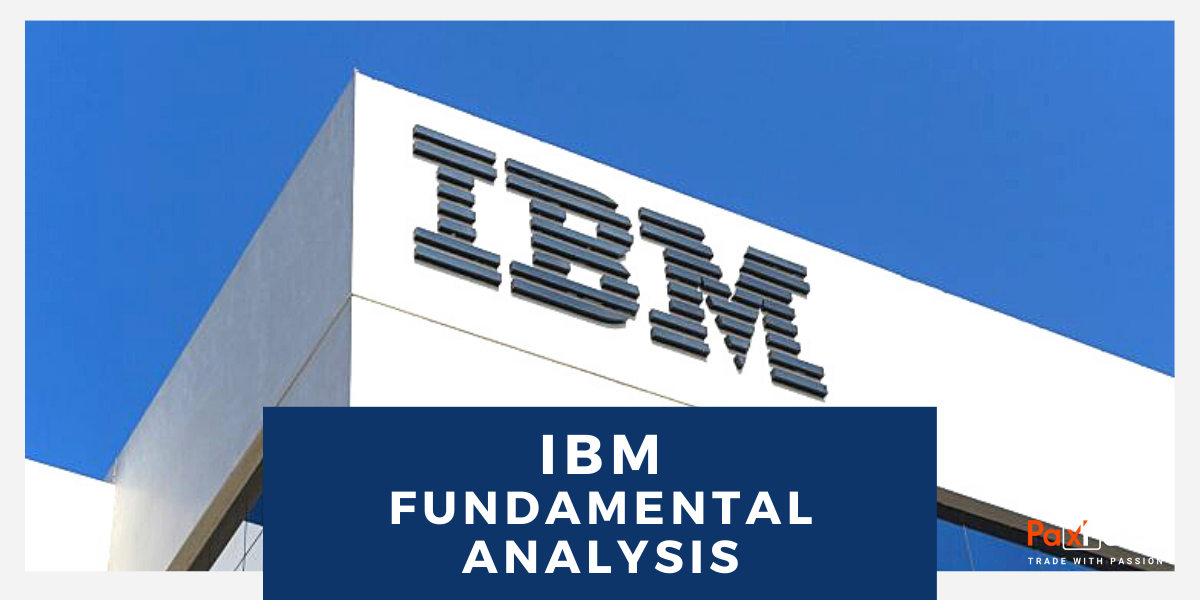
Source: PaxForex Premium Analytics Portal, Fundamental Insight
IBM recently reached a major achievement in its multi-year reorganization. In November, IBM completed the spin-off of parts of its old segments into a new publicly-traded company called Kyndryl Holdings.
IBM made the move to focus on the parts of its business that are centered around cloud computing and artificial intelligence technology.
Now that the spin-off is complete, is it the right time to stock up IBM stocks? To answer that question, we need to find out how the loss of Kyndryl will affect the company and whether IBM's remaining businesses make a worthy long-term investment.
Kyndryl delivers IT infrastructure services, and with a large client base of 4k customers, Kyndryl provided a significant portion of IBM's revenue. In the first three quarters of this year, IBM had $54.1 billion in revenue. Of that, Kyndryl generated $14.1 billion. But while Kyndryl brought in a significant amount of sales for IBM, it held back revenue growth. Kyndryl's $14.1 billion in revenue this year was down from $14.4 billion in 2020.
Although Kyndryl is an established business, it is not profitable. Its net loss for the three quarters of 2021 climbed to $1.6 billion from $1.3 billion in the previous year. IBM's total net income in 2021 for the same period was $3.4 billion.
After the separation of the loss-making Kyndryl business, investors were left with the most attractive aspects of the company. IBM's cloud computing businesses have seen steady revenue growth. Over the past year, the business's total cloud computing revenue has grown 14 percent year over year.
The cloud and cognitive software segment, which portrays the core of IBM's post-Kyndryl business, saw revenue grow 2.5% year over year to $5.7 billion in the third quarter. Annual revenue for this division reached $17.2 billion, up from $16.5 billion in 2020.
This year's revenue growth is no coincidence. The cloud and cognitive software division have been steadily increasing revenue for several years.
IBM's success isn't limited to the cloud and cognitive software segment. The company's Global Business Services division brought $4.4 billion to revenue growth in Q3, an 11.6% increase over last year.
The global business services segment includes IBM's consulting division, which saw year-over-year revenue growth of 17% in the third quarter as it helped clients implement the company's cloud solutions. Global business services, together with the cloud and cognitive software divisions, account for more than 70% of IBM's revenue after the Kyndryl split, CFO James Kavanaugh said.
Investors who waited to buy the stock until after the Kyndryl spin-off get one more advantage: a high-yield dividend. As of this writing, IBM has a dividend yield of more than 5%, while Kyndryl currently pays no dividend. This persists in IBM's unchanged series of dividend payments since 1916.
IBM's dividends are driven by its capability to bring free cash flow. For more than a decade, the company has generated more than $10 billion in free cash flow each year.
Despite the revenue lost with the departure of Kyndryl, IBM retains much of its ability to generate free cash flow. In 2020, for example, IBM's free cash flow was $10.8 billion. If Kyndryl's contribution is excluded, IBM will retain about $10 billion of that free cash flow.
Beginning in 2022, IBM expects single-digit free cash flow growth to continue through 2024, totaling about $35 billion. This growth comes from anticipated revenue growth of about $3 billion each year through 2024.
After Kyndryl was spun off, IBM represents an attractive opportunity for investors. Of course, the company isn't going to overtake larger competitors in cloud computing anytime soon. Nevertheless, the company has successfully carved out a piece of the cloud computing pie for itself through its hybrid cloud strategy.
The hybrid cloud strategy is specifically attractive to particular industries, including financial services. It converges the low cost of a public cloud solution, such as that provided by Amazon, with a private cloud for businesses, such as banks, that need regulatory compliance and extra security to protect sensitive data.
IBM's history of cloud solution revenue growth shows that its offerings are winning over customers. Combined with projected revenue growth over the next few years, an even ability to bring free cash flow, and a high dividend, this makes IBM stock an excellent investment option.
As long as the price is above the 122.00 level, follow the recommendations below:
- Time frame: D1
- Recommendation: long position
- Entry point: 130.55
- Take Profit 1: 132.00
- Take Profit 2: 135.00
Alternative scenario:
If the level of 122.00 is broken-down, follow the recommendations below:
- Time frame: D1
- Recommendation: short position
- Entry point: 122.00
- Take Profit 1: 118.00
- Take Profit 2: 116.00













